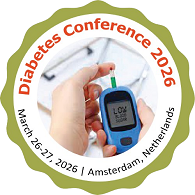Sessions and Tracks
Endocrinology is the branch of medicine that focuses on the endocrine system, which includes glands that release hormones into the bloodstream to regulate various body functions. These glands include the thyroid, adrenal, and pituitary glands, among others. Endocrinologists diagnose and treat conditions related to hormonal imbalances and endocrine disorders, such as thyroid diseases, growth issues, and metabolic disorders. Diabetes is a chronic condition that falls under the purview of endocrinology. It involves the body's inability to regulate blood sugar (glucose) levels properly. There are two primary types of diabetes: Type 1 diabetes, an autoimmune condition where the body attacks insulin-producing cells in the pancreas, and Type 2 diabetes, which is characterized by insulin resistance and often associated with obesity and lifestyle factors. Managing diabetes typically involves lifestyle modifications, blood sugar monitoring, and medications such as insulin or oral hypoglycaemic.
Diabetes research and therapeutics have evolved rapidly over the past few decades, driven by a surge in scientific understanding and technological innovation. This field has made significant strides in developing new strategies for the prevention, management, and potential cure of diabetes, particularly type 1 and type 2 diabetes. Researchers are now focusing on advanced approaches that go beyond traditional treatments, exploring areas like precision medicine, genetics, and regenerative medicine to create more effective, individualized therapies. Recent advancements in diabetes therapeutics include the development of continuous glucose monitors (CGMs) and artificial pancreas systems, which have revolutionized blood sugar management for millions of patients. These devices offer real-time glucose tracking, helping individuals make timely decisions and avoid potentially dangerous fluctuations in blood sugar levels. Additionally, the integration of insulin pumps and closed-loop systems has significantly enhanced the control of glucose levels by automating insulin delivery based on continuous feedback. In terms of pharmacological advancements, newer classes of diabetes medications, such as SGLT2 inhibitors and GLP-1 receptor agonists, have proven to be effective not just in lowering blood sugar but also in reducing the risk of cardiovascular events and weight management. Researchers are also investigating drugs that target different metabolic pathways to improve insulin sensitivity and promote β-cell regeneration. Gene therapy and stem cell-based therapies are emerging fields with the potential to modify or restore pancreatic function, offering hope for a future where diabetes could be managed or even reversed.
Gestational diabetes mellitus (GDM) is a form of diabetes that occurs during pregnancy, typically in the second or third trimester. It is characterized by glucose intolerance and elevated blood sugar levels. Proper management of GDM is crucial for the health of both the mother and the fetu. GDM risk is higher in women with obesity, a family history of diabetes, advanced maternal age, a previous history of GDM, or polycystic ovary syndrome (PCOS). Universal screening is usually conducted between 24 and 28 weeks of gestation using an oral glucose tolerance test (OGTT). A balanced diet with controlled carbohydrate intake and regular physical activity are the first-line treatments. Regular monitoring of blood sugar levels helps ensure they remain within target ranges. Women with GDM are at an increased risk of developing preeclampsia, a condition characterized by high blood pressure and potential organ damage. Infants should be monitored for hypoglycemia and other potential complications shortly after birth. Breastfeeding is encouraged as it may help regulate the infant's blood sugar levels. By understanding and managing gestational diabetes, healthcare providers can significantly improve outcomes for both mothers and their babies, ensuring a healthier pregnancy and reducing the risk of long-term complications.
Endocrine disruptions and environmental factors represent a critical area of study, shedding light on how external agents interfere with hormonal balance and overall endocrine health. Endocrine-disrupting chemicals (EDCs), such as pesticides, industrial pollutants, plastics (e.g., bisphenol A or BPA), and heavy metals, have been shown to mimic, block, or alter the normal function of hormones, leading to significant health concerns. These disruptions can affect growth, metabolism, reproduction, and even neurological development, with long-term implications for individuals and populations. The impact of EDCs is particularly concerning because they are pervasive in everyday life. From contaminated food and water sources to air pollutants and consumer products, exposure to these chemicals is nearly unavoidable. Research has linked EDCs to a range of health conditions, including obesity, diabetes, thyroid dysfunction, infertility, and certain cancers such as breast and prostate cancer. Emerging evidence also suggests that EDCs may play a role in neurodevelopmental disorders like autism and ADHD, as well as immune system dysregulation.Environmental factors like climate change and urbanization further exacerbate the risk of endocrine disruption. Rising temperatures, altered ecosystems, and increased use of agricultural chemicals contribute to higher exposure levels and a greater burden on human health. Vulnerable populations, such as children, pregnant women, and individuals in low-income communities, are often disproportionately affected due to increased sensitivity to hormonal changes and limited access to preventive resources.
Diabetes and metabolic syndrome are closely related health conditions that significantly impact an individual's risk for cardiovascular diseases and other serious health issues. Understanding the connection between these conditions is essential for effective prevention and management. Metabolic syndrome is a cluster of conditions that occur together, increasing the risk of heart disease, stroke, and type 2 diabetes. A common feature of metabolic syndrome and a precursor to type 2 diabetes, insulin resistance occurs when cells in the body become less responsive to insulin, leading to elevated blood sugar levels. Central obesity is a key component of metabolic syndrome and a major risk factor for developing type 2 diabetes. Chronic low-grade inflammation, often seen in individuals with metabolic syndrome, contributes to the development of insulin resistance and diabetes. Adopting a healthy lifestyle is crucial in managing both diabetes and metabolic syndrome. Frequent monitoring of blood sugar, blood pressure, and lipid levels to manage and prevent complications. Use of medications as prescribed to control blood sugar, blood pressure, and cholesterol levels. Educating patients about the importance of lifestyle changes and adherence to treatment plans. By addressing the components of metabolic syndrome, individuals can significantly reduce their risk of developing type 2 diabetes and its associated complications. Early intervention and comprehensive management are key to improving health outcomes and preventing the progression of these interrelated conditions.
Pediatric endocrinology and diabetes focus on understanding, diagnosing, and managing hormonal and metabolic disorders in children and adolescents. These conditions, which can significantly impact growth, development, and overall well-being, require specialized care tailored to the unique physiological and psychological needs of young patients. The field encompasses a wide range of disorders, including diabetes, growth abnormalities, thyroid dysfunction, adrenal and pituitary disorders, and puberty-related issues. Pediatric diabetes, primarily type 1 diabetes, is one of the most common chronic conditions in children. Advances in diabetes care, such as continuous glucose monitors (CGMs), insulin pumps, and closed-loop systems, have transformed disease management, enabling better blood sugar control and reducing the risk of complications. Type 2 diabetes, previously rare in children, is becoming increasingly prevalent due to rising obesity rates and lifestyle changes. This shift underscores the need for early intervention, preventive strategies, and comprehensive education for families to address the root causes.In addition to diabetes, pediatric endocrinologists manage conditions such as growth hormone deficiencies, which can lead to stunted growth, and precocious or delayed puberty, which can affect a child’s physical and emotional development. Disorders like congenital adrenal hyperplasia, hypothyroidism, and rare genetic syndromes such as Turner syndrome or Prader-Willi syndrome also fall under the purview of pediatric endocrinology.
Effective management of diabetes hinges on comprehensive nutrition and lifestyle interventions. These approaches not only help in maintaining optimal blood glucose levels but also reduce the risk of diabetes-related complications. Focus on complex carbohydrates such as whole grains, legumes, fruits, and vegetables, which have a lower glycemic index and cause a slower rise in blood sugar levels. Include lean protein sources such as fish, poultry, beans, and nuts to support muscle mass and overall health. Choose healthy fats from sources like avocados, olive oil, nuts, and seeds while avoiding trans fats and limiting saturated fats. Monitor portion sizes to prevent overeating and maintain a healthy weight. Using smaller plates and being mindful of serving sizes can help. Distribute meals evenly throughout the day to avoid large fluctuations in blood sugar levels. Smaller, more frequent meals can help maintain steady glucose levels. Increase dietary fiber intake from whole grains, fruits, vegetables, and legumes to improve blood sugar control and support digestive health. Avoid foods and drinks high in added sugars, such as sodas, candies, and desserts, which can cause rapid spikes in blood sugar levels.
Thyroid disorders encompass a range of conditions that affect the thyroid gland, a small but critical endocrine organ responsible for regulating metabolism, energy production, and hormonal balance. The most common thyroid disorders include hypothyroidism, hyperthyroidism, thyroid nodules, and thyroid cancer. These conditions can arise from autoimmune diseases, iodine deficiency, genetic predisposition, or environmental factors and may significantly impact an individual’s physical and mental health. Diagnosis of thyroid disorders relies on a combination of clinical evaluation, laboratory testing, and imaging techniques. Blood tests measuring thyroid-stimulating hormone (TSH), free T4, and free T3 levels are the cornerstone for identifying dysfunction. For autoimmune-related thyroid conditions such as Hashimoto’s thyroiditis or Graves’ disease, the presence of thyroid-specific antibodies (e.g., TPOAb or TRAb) provides additional diagnostic clarity. Imaging modalities like ultrasound, radioactive iodine uptake (RAIU) scans, or fine-needle aspiration (FNA) biopsies are employed to assess structural abnormalities, detect nodules, and evaluate malignancy risk. Hypothyroidism is typically treated with levothyroxine, a synthetic form of T4 that normalizes TSH levels and alleviates symptoms like fatigue, weight gain, and cold intolerance. Hyperthyroidism requires approaches to reduce thyroid hormone production or release, including antithyroid medications (e.g., methimazole, propylthiouracil), radioactive iodine therapy, or surgical interventions in severe cases. Emerging research and advancements in thyroid ology are transforming both diagnosis and treatment. Innovations in molecular testing are improving the accuracy of cancer risk assessment in thyroid nodules, while personalized medicine approaches are refining treatment protocols for autoimmune thyroid disorders. Additionally, new formulations of thyroid hormone replacement therapies, such as liquid or soft-gel forms, are enhancing patient adherence and satisfaction.
The psychosocial aspects of diabetes care encompass the psychological, social, and emotional well-being of individuals living with diabetes. Managing diabetes is not only a physical challenge but also a mental and emotional one. Understanding and addressing these aspects is crucial for comprehensive diabetes management and improving patients' quality of life. Living with diabetes can cause significant stress and anxiety, impacting blood sugar control and overall health. Patients often worry about managing their condition, potential complications, and lifestyle changes. People with diabetes are at a higher risk of developing depression. Depression can negatively affect diabetes management, leading to poor adherence to treatment plans and worsening health outcomes. A specific emotional burden related to diabetes management, including feelings of frustration, burnout, and helplessness due to the constant demands of managing the condition. Psychological factors significantly influence patients' adherence to medication, diet, and exercise regimens. Motivation, self-efficacy, and coping strategies play critical roles in maintaining adherence. Adapting to a diabetes-friendly lifestyle involves significant behavioural changes. Support and education are essential to help patients make and sustain these changes. The support system of family and friends is vital in diabetes management. Encouragement and assistance from loved ones can help patients adhere to their treatment plans and maintain a positive outlook.
Adrenal and pituitary disorders encompass a variety of conditions that affect two essential endocrine glands responsible for regulating key physiological processes, including metabolism, growth, stress response, and hormone balance. The adrenal glands, located above the kidneys, and the pituitary gland, located at the base of the brain, are interconnected through the hypothalamic-pituitary-adrenal (HPA) axis, which plays a critical role in maintaining homeostasis. Cushing's Syndrome, characterized by excessive cortisol production, leading to symptoms such as weight gain, hypertension, muscle weakness, and glucose intolerance. Addison's Disease, a result of adrenal insufficiency, causing fatigue, weight loss, hypotension, and electrolyte imbalances. Primary Aldosteronism, involving overproduction of aldosterone, leading to hypertension and low potassium levels.Adrenal Tumors and pheochromocytomas, which can disrupt normal hormone production and cause severe symptoms, including episodes of hypertension and palpitations.Diagnosing adrenal and pituitary disorders involves a combination of hormone testing, imaging studies (such as MRI or CT scans), and dynamic endocrine function tests to assess the glands' responses to stimulation or suppression. Early and accurate diagnosis is critical to prevent complications and ensure effective treatment.
Diabetes prevention and public health initiatives are critical in addressing the growing global burden of diabetes. By focusing on lifestyle modifications, community interventions, and policy changes, it is possible to reduce the incidence of type 2 diabetes and improve the overall health of populations. Implementing public health campaigns to raise awareness about diabetes risk factors, prevention strategies, and the importance of healthy lifestyles. Engaging with communities to provide education on healthy eating, physical activity, and weight management. Implementing health education programs in schools to promote healthy lifestyles and prevent childhood obesity, a risk factor for type 2 diabetes. Encouraging the adoption of a healthy diet rich in fruits, vegetables, whole grains, and lean proteins, while limiting sugary beverages and processed foods. Promoting regular physical activity, such as walking, cycling, or sports, to help maintain a healthy weight and improve insulin sensitivity. Identifying individuals at high risk of developing diabetes through screening tests, such as blood glucose tests or A1C tests.
The connection between diabetes and cardiovascular health is profound, as individuals with diabetes, particularly type 2, face a significantly higher risk of developing cardiovascular diseases (CVD). This relationship is driven by chronic hyperglycemia, insulin resistance, and associated metabolic disturbances, which collectively contribute to the development of atherosclerosis, hypertension, and other cardiovascular complications. Managing this dual burden is a critical priority in diabetes care. Persistent high blood sugar damages the endothelium, the inner lining of blood vessels, impairing vascular elasticity and function. levated glucose levels trigger systemic inflammation and oxidative stress, promoting the formation of arterial plaques. Advances in research are shedding light on the intricate mechanisms linking diabetes and cardiovascular health. Precision medicine approaches, such as genetic profiling and novel biomarkers, are enabling tailored interventions. Additionally, wearable technologies and digital health tools are revolutionizing monitoring and management, empowering patients to take an active role in their care.By integrating innovative therapies, preventative strategies, and patient-centered care, the management of diabetes and cardiovascular health is steadily improving. These efforts aim to reduce the global burden of diabetes-related cardiovascular complications and enhance the quality and longevity of life for affected individuals.
Diabetic retinopathy is a diabetes complication that affects the eyes. It is caused by damage to the blood vessels of the light-sensitive tissue at the back of the eye (retina). The condition can develop in anyone who has type 1 or type 2 diabetes and is a leading cause of blindness in adults. Chronic high blood sugar levels can cause damage to the blood vessels in the retina. The blood vessels may swell and leak, or abnormal new blood vessels may grow on the surface of the retina, leading to vision problems. Early stage where small areas of swelling occur in the retina's blood vessels. Many more blood vessels are blocked, depriving the retina of its blood supply, leading to the growth of new blood vessels. Advanced stage where new, abnormal blood vessels proliferate, which can lead to severe vision loss or blindness. Annual comprehensive eye exams can detect retinopathy early. Maintaining good control of blood sugar, blood pressure, and cholesterol levels can help prevent or delay the onset of diabetic retinopathy. Adopting a healthy diet, regular exercise, and avoiding smoking can contribute to overall eye health. Diabetic retinopathy is a serious complication of diabetes that can lead to vision loss if not detected and managed early.
Dialysis and transplantation are critical medical treatments used to manage and treat end-stage renal disease (ESRD) and severe kidney failure. These therapies help maintain the patient's health by either replacing the function of the failed kidneys or by providing a new, functioning kidney. Dialysis is a medical procedure that replicates the kidney's essential functions, such as removing waste products and excess fluid from the blood. Blood is removed from the body, filtered through a dialyzer (an artificial kidney), and then returned to the body. This process removes waste products, extra chemicals, and fluid. Requires vascular access, usually through an arteriovenous (AV) fistula, AV graft, or a central venous catheter. Uses the lining of the abdomen (peritoneum) as the filter. A cleansing fluid (dialysate) is introduced into the abdominal cavity through a catheter, where it absorbs waste products and excess fluids from blood vessels in the peritoneum. The fluid is then drained and replaced. Continuous Ambulatory Peritoneal Dialysis (CAPD) and Automated Peritoneal Dialysis (APD). Requires a sterile environment to prevent infections; less effective for some patients compared to hemodialysis. Kidney transplantation involves surgically placing a healthy kidney from a donor into a patient with ESRD. It is considered the most effective treatment for kidney failure. A kidney from a living person, often a family member or close friend. Offers better survival rates and longevity. Both treatments require lifestyle adjustments. Dialysis impacts daily schedules and requires diet and fluid restrictions.
Mobile health applications, often referred to as mHealth apps, have become an essential tool in modern healthcare, particularly for chronic conditions like diabetes. These apps offer a variety of functionalities that help patients manage their health more effectively, providing tools for monitoring, education, and communication with healthcare providers. Users can log their blood glucose levels manually or sync data from continuous glucose monitors (CGMs) and blood glucose meters. Many apps allow users to record their insulin doses and other medications, helping to ensure proper management and avoid missed doses. Many apps allow users to record their insulin doses and other medications, helping to ensure proper management and avoid missed doses. Apps can integrate with fitness trackers to monitor physical activity, providing insights into how exercise affects blood glucose levels. Apps often provide educational content on managing diabetes, including tips on diet, exercise, and medication adherence. Some apps offer healthy recipes and meal planning tools tailored to the dietary needs of individuals with diabetes. Apps analyse logged data to identify patterns and trends, helping users and their healthcare providers make informed decisions. Many apps allow for virtual consultations with healthcare providers, enabling remote monitoring and advice. Some apps offer forums or social features where users can connect with others managing similar health conditions, providing peer support. AI algorithms provide tailored advice on insulin dosing, diet, and lifestyle changes based on individual data. Machine learning models predict blood glucose fluctuations and potential complications.
The field of endocrinology and diabetes is undergoing a revolution, driven by innovative technologies that are transforming diagnosis, treatment, and patient management. These advancements are improving the precision of care, enhancing patient outcomes, and fostering a deeper understanding of complex endocrine and metabolic disorders. From wearable devices to artificial intelligence (AI), these technologies are reshaping the landscape of healthcare. Wearable technologies, such as continuous glucose monitors (CGMs) and smart insulin pens, are empowering patients with real-time insights into their health Continuous Glucose Monitors (CGMs) Devices like the Dexcom G6 or Freestyle Libre provide real-time glucose readings, allowing patients to track trends and make informed decisions about diet, exercise, and medication.Smart Insulin Pens and Pumps: These devices deliver insulin precisely and can be synced with smartphones to provide data on dosing history, aiding better glycemic control.Fitness and Activity Trackers: By monitoring activity levels, heart rate, and sleep patterns, these tools support holistic diabetes management. Hybrid closed-loop systems, also known as artificial pancreas systems, combine CGMs and insulin pumps with AI-driven algorithms to automate insulin delivery, mimicking the natural pancreatic response. These systems significantly reduce the burden of diabetes management.The future of endocrinology and diabetes care lies in the integration of emerging technologies like robotics, blockchain for data security, and advanced sensors. Innovations such as non-invasive glucose monitoring, precision medicine approaches, and 3D bioprinting of endocrine tissues hold immense promise.
Integrative and holistic approaches to healthcare focus on treating the whole person—mind, body, and spirit—rather than just managing symptoms of a disease. These methods combine evidence-based conventional medicine with complementary therapies, creating a personalized plan that addresses the root causes of illness, promotes healing, and enhances overall well-being. In the context of endocrinology and diabetes care, integrative approaches are gaining prominence as they offer comprehensive solutions to manage chronic conditions and improve quality of life. Patient-Centered Care is a Prioritizing the individual’s unique needs, values, and preferences in the treatment plan. Prevention and Wellness Emphasizing lifestyle modifications to prevent disease progression and foster long-term health. Integrative approaches require collaboration among healthcare providers, thorough evaluation of complementary therapies for safety and efficacy, and patient education to ensure informed decision-making.As research into integrative medicine grows, its applications in endocrinology and diabetes are expanding. Advances in digital health and wearable devices are also supporting holistic care by providing real-time data for personalized interventions. By bridging traditional medicine with innovative and natural therapies, integrative care is paving the way for a more inclusive and effective healthcare model.
Endocrinology and aging intersect in significant ways, as the endocrine system plays a crucial role in maintaining homeostasis and supporting the body's functions throughout life. As individuals age, the endocrine system undergoes natural changes that can impact metabolism, growth, mood, and overall health. Understanding these changes is vital for managing age-related conditions and promoting healthy aging. Levels of growth hormone and its mediator, insulin-like growth factor 1 (IGF-1), decrease with age, contributing to reduced muscle mass, increased body fat, and decreased bone density. Hypothyroidism, or underactive thyroid, becomes more common with age and can lead to symptoms such as fatigue, weight gain, and cognitive decline. The adrenal glands, which produce cortisol and other hormones, experience a decline in function known as adrenal insufficiency or adrenal fatigue, leading to lower energy levels and increased vulnerability to stress.In women, estrogen and progesterone levels drop during menopause, impacting reproductive health, bone density, cardiovascular health, and mood. In men, testosterone levels gradually decrease, potentially leading to symptoms like reduced libido, muscle loss, and mood changes.
Track 19: Genomics and Molecular Endocrinology
Genomics and molecular endocrinology represent a dynamic field at the intersection of genetics, molecular biology, and endocrinology, offering a deeper understanding of how genetic factors and molecular mechanisms influence hormonal regulation and endocrine health. This field examines how the genetic makeup of individuals affects the function of the endocrine system, the development of endocrine disorders, and the body’s response to various treatments. By leveraging advancements in genomics and molecular research, scientists and clinicians can gain valuable insights into the mechanisms underlying hormone synthesis, regulation, and signalling pathways, leading to more precise diagnostics and targeted therapies. Genomics involves studying the entirety of an organism's genetic material, known as its genome. In endocrinology, genomics helps researchers identify gene variations and mutations that influence hormone production, receptor sensitivity, and metabolic processes. Techniques such as whole-genome sequencing and genome-wide association studies (GWAS) have identified genetic predispositions to common endocrine disorders, including type 1 and type 2 diabetes, thyroid diseases, polycystic ovary syndrome (PCOS), and growth disorders.Molecular endocrinology delves into the cellular and molecular pathways that regulate the production, release, and function of hormones. This includes the study of how hormone receptors work at a molecular level, how signaling pathways are activated, and how these pathways affect gene expression and cellular function.

















